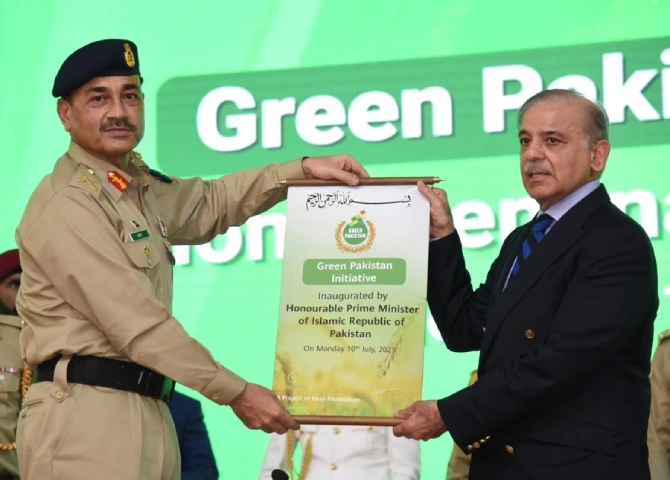

Pak Army Chief Gen.Asif Munir (Left) and PM Shehbaz Sharif (Right) are scripting Pakistan's post-Imran Khan transition
Pakistan’s post-Imran transition that began on May 9 when vandals, mostly supporters of the ex-Prime Minister, frontally took on the military by attacking key symbols of the army’s power and authority including the General Headquarters in Rawalpindi and Jinnah House, the corps commander’s residence in Lahore.
But Pakistan’s pivotal transition would be complete only after an emboldened military regains its stature of a master puppeteer pulling the strings, whenever required, of a political dispensation that is free from Khan’s sleeper cells. The transition, which has commenced with the destruction of the core of Pakistan Tehreek-Insaf (PTI), the ex-PM’s party, and will culminate with general elections, must overcome many more hurdles to run its course.
The key to a new beginning is the military’s readiness for elections. Right now, it does not appear that the armed forces are ready for the polls. There are three factors that are persuading the military top brass led by Chief of Army Staff, Gen. Asim Munir to delay the polls.
First, the eco-system supporting the ex-Prime Minister is yet to be entirely destroyed, though significant gains have been made. Right now, the Chief Justice of the Pakistan, Umar Ata Bandial is standing majorly in the way of the fulfilment of Gen. Munir’s plan.
Both the military and Prime Minister Shehbaz Sharif’s coalition government are aware that Bandial may strike down any move to try Imran Khan in a military court, the key to removing him from political contention. In fact, they are keenly watching the the Supreme Court hearing, which resumed on July 18 on whether the prime accused in the May 09 rebellion, including Khan, can be tried by military courts. It will not be surprising if Bandial, who is left with two months in office, rules against trial by military courts.
In fact, the coalition government does not want to arrest Khan, for instance, in both the Toshakhana and Al-Qadir cases, which can serve as the basis of disqualifiying the ex-Prime Minister for standing in elections. It is fully aware that Bandial can immediately release Khan in case he is docked by the incumbent government. Therefore, both the military and the coalition government are waiting for Bandial’s retirement on September 16 before mobilising the next course of legal action against Khan.
Second, the Shehbaz Sharif government does not want to initiate moves against Khan, in tune with the wishes of the Pakistan Muslim League-Nawaz (PML-N) supremo Nawaz Sharif. The senior Sharif has told the party leadership that the military, on its own, should clear the mess that it had created earlier by enabling Khan’s elevation to leadership position. Consequently, the coalition government would want a caretaker government, likely to be appointed after August 8, to start acting against Khan. Incidentally, Geo News is reporting that the PML-N and the Pakistan People’s Party (PPP) — the two major stakeholders in the federal government — have agreed to dissolve the National Assembly on August 08.
There are indications that Khan will be tried by civilian courts during the caretaker government’s tenure. Information Minister of Punjab Amir Mir has said that eight cases in connection with May 09 incidents have been registered against Imran Khan and he will be arrested at an appropriate time. He added that cases against 58 May 09 accused have been sent to military courts.
Third, the military wants to buy time to address the volatile situation in Khyber Pakhtunkhwa, as well as Balochistan, where the insurgency is gaining further momentum. Besides, Pakistan’s relationship is going downhill with the Taliban in Afghanistan, which has become a base for the cross-border attacks by the Tehreek-e-Taliban Pakistan (TTP), which is extremely active in the North and South Waziristan areas of Khyber Pakhtunkhwa.
Consequently, it appears that the Gen. Munir- led establishment is not in a mood to hold elections before March 2024. Therefore, the option of census followed by delimitation process, which will take 4-5 months is likely to be exercised. This process will also be constitutional to convince the International Monetary Fund (IMF) that no extra constitutional action has been taken.
India Narrative has learnt that the military continues to back Shehbaz Sharif as their blue-eyed boy to lead the post-election government, which in all probability will be replica of the incumbent government relying on small parties and groups. Islamabad is rife with speculations and whispers in the corridors that he will again lead the new coalition government whenever it is formed. Hamza Shehbaz Sharif has also become active and it is said that Nawaz Sharif is still not acceptable as PM and his daughter, Maryam Nawaz will also not get the slot of Chief Minister of Punjab. Apparently former President Asif Zardari of the PPP has also been conveyed the message and intentions of the establishment. As far as the caretaker PM is concerned, military leadership is steadfast on its favourite Mohsin Baig, reservations of the coalition government notwithstanding.
Also Read: Will Mohsin Beg become Pakistan’s caretaker Prime Minister after Imran Khan’s exit?
New Zealand's Deputy Prime Minister and Foreign Minister Winston Peters has arrived Kathmandu on his…
The Indian Army and the Mongolian Armed Forces will commence the 17th edition of their…
Pandi Ram Mandavi, a renowned artist from Bastar, Chhattisgarh, was conferred the Padma Shri award…
Taiwan's Mainland Affairs Council (MAC) criticised China on Wednesday for organising two summits for Taiwanese…
The East Turkistan Government in Exile (ETGE) vehemently denounces Mr. Francesco Frangialli, the Honorary Secretary-General…
Chairman John Moolenaar and Ranking Member Raja Krishnamoorthi of the House Select Committee on the…